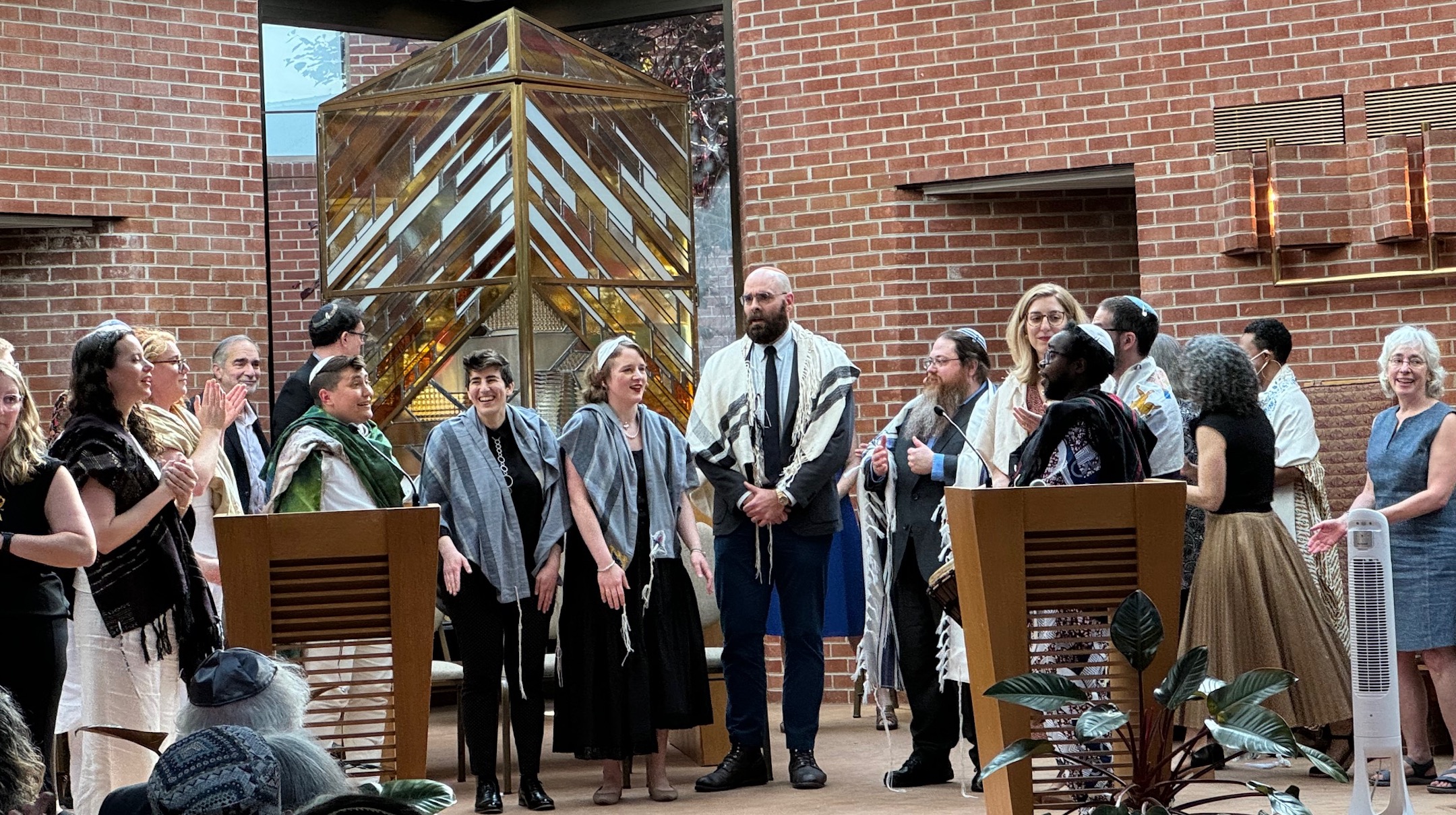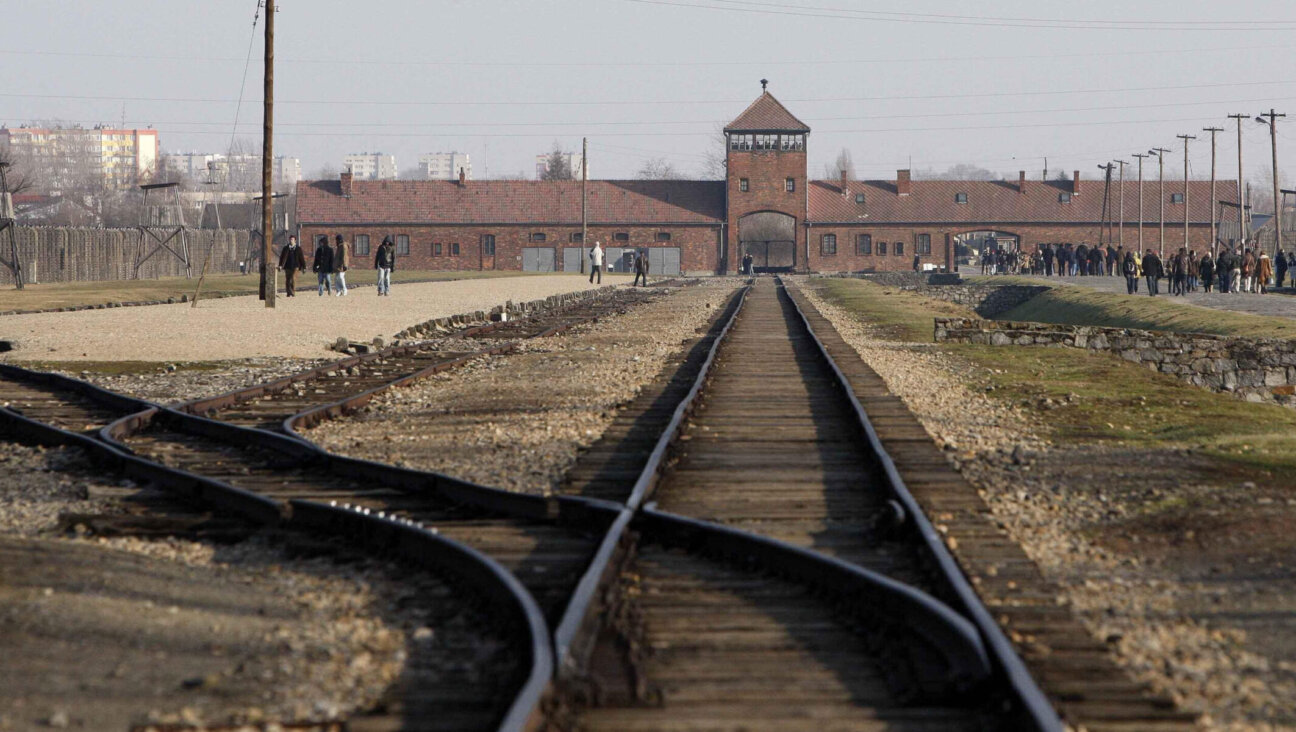At Reconstructionist Rabbinical College ordination, angst over Israel shares stage with 11 new rabbis
At least two of the new rabbis are avowedly anti-Zionist, a relatively common orientation in their movement

Eleven graduates of the Reconstructionist Rabbinical College were ordained as rabbis in a ceremony in Abingdon, Pennsylvania, May 19, 2024. (Stephen Silver)
ABINGTON, Pa. (JTA) – The discord tearing apart the Reconstructing Judaism movement was on full view Sunday, as the movement’s rabbinical school ordained 11 new rabbis in a ceremony rife with references to Israel’s war in Gaza and the ways in which it is dividing an already small denomination.
“This year, the attacks of Oct. 7, the war between Hamas and Hezbollah and Israel, and the terrible situation in Gaza has been at the forefront of the RRC community,” Rabbi Deborah Waxman, president of the Reconstructionist Rabbinical College, said at the graduation.
“It has been incredibly challenging,” she said, adding, “I wrote these words before last Friday.”
That remark appeared to be a reference to an op-ed published by two rabbinical students who say they left the school this year after enduring harassment for their pro-Israel views. The essay, published in the Forward, wasn’t the only sign of tension around Israel at the ordination ceremony: While the venue — Temple-Beth Am, a Reform synagogue in suburban Philadelphia — had a “We Stand With Israel” sign outside the building and an Israeli flag at the entrance, the American and Israeli flags flanking the synagogue sanctuary were obscured by large plants. (Last year’s ceremony also did not feature flags; two years ago, it did. Both were held at different locations.)
“Until this year, I didn’t fully appreciate how hard it is to build and maintain a community based on our principles at a moment of deep crisis,” Seth Rosen, chair of Reconstructing Judaism’s Board of Governors, said at the graduation.
“The last seven months have challenged our ability to remain a community across differences like nothing in our collective memory,” Rosen added. “We live in a moment when it is so clear that our shared, deeply-rooted Jewish values can lead us to very different conclusions about very important things.”
Jewish spaces and organizations across the United States have endured debate and division over Israel in the wake of Oct. 7 and Israel’s war against Hamas in Gaza, which has come with a reported spike in antisemitism nationwide. What sets Reconstructing Judaism apart is that many of its rabbis and rabbinical students have been leaders of groups that harshly criticize Israel or disavow Zionism entirely.
A leading pro-Israel Reform rabbi recently lamented in a sermon how many Reform Jews are involved in anti-Zionist protests, while Conservative Judaism has had to grapple with the prominence of graduates of the movement’s Ramah camps in IfNotNow, an anti-occupation group that accuses Israel of “genocide” and has participated in major anti-Zionist demonstrations since the war’s start.
But Reconstructionist rabbis are proportionally the most represented in the anti-Zionist movement: RRC graduates and students make up at least 25 of the 45 members of the rabbinical council of Jewish Voice for Peace, the biggest Jewish anti-Zionist organization. And they have played a prominent role in the public response to the war, with an RRC graduate, for example, interrupting President Joe Biden on Nov. 1 to call for a ceasefire.
Speaking at the ordination ceremony, Waxman affirmed that the movement supports Israel’s right to exist but is open to ordaining rabbis who depart from its position on the country.
“The stance of the Reconstructionist movement since the time of Mordecai Kaplan to this day is that Israel has a right to exist and is a vital center for Jewish life and the Jewish people,” Waxman said. “We care deeply about the Jewish people across geography, and we stand in solidarity with Israelis. And at the end of the day, any litmus test we have in the Reconstructionist Movement is not about particular stances around Israel.”
Instead, she said, the movement’s litmus test is “the capacity to center relationships and to build covenantal community across our differences.”
Unlike university commencements nationwide in recent weeks, the graduation itself was not disrupted at any point, and the event had an overwhelming air of warmth. There was no booing or visible anger in the crowd, though some did snap their fingers in agreement at various times, including with statements expressing support for Palestinian rights.
And a group of about 10 pro-Israel protesters gathered outside the synagogue’s entrance in opposition to former Democratic Rep. Andy Levin of Michigan, who received RRC’s Keter Shem Tov Award, meaning Crown of a Good Name, along with his father and predecessor, former Rep. Sander Levin. Earlier this year, Andy Levin supported the “Uncommitted” movement in Michigan to pressure President Joe Biden to abandon his support for Israel’s military campaign.
The group carried signs reading, “Andy Levin: You Do Not Deserve an Award, You Deserve Condemnation and Contempt,” “Pro-Israel and Pro-America,” and “Israel We Stand With You.” The group did not enter the synagogue during the event. When asked about his reaction to the protest, Levin declined to comment.
Levin’s support for Palestinians drew cheers at the ceremony. The American Israel Public Affairs Committee targeted Levin in a 2022 primary, which he lost. At the graduation, Rosen quoted an interview Levin gave that year in which he said, “AIPAC can’t stand the idea that I am the clearest, strongest Jewish voice in Congress standing for a simple proposition: that there’s no way to have a secure home for the Jewish people unless we achieve the political and human rights for the Palestinians.”
Advocacy for Palestinians got other mentions as well. Following the individual ordinations, the new rabbis made a series of statements of thanks, followed by the entire class stating “Toda raba,” Hebrew for “thank you very much.” The messages of thanks included thanking “our teachers” for “showing by example how to stand up for Palestinian rights as a rabbi,” and for “knowing that Jewish and Palestinian safety are intertwined.”
In her remarks, Waxman noted that this was not the only time of turmoil the students have experienced since most of them entered RRC five years ago. Their experience, she said, was “forged in the intensity of these last several years, these last several days.” Many of the graduating students began in 2019, before the start of the pandemic, and attended remotely for a time until the campus reopened in the fall of 2021.
Their time in the school also included the racial justice protests spurred by the 2020 police murder of George Floyd and a worsening climate crisis.
“We choose community over radical individualism, and in doing this, we repudiate nihilism with intention and forcefulness,” Waxman said.
The graduates have been involved in a range of Israel-focused organizations, ranging from progressive pro-Israel to anti-Zionist. Two of them work at Makom, a new anti-Zionist Jewish community in Durham, North Carolina.
Being open to a diverse range of Jews has long been a point of pride for Reconstructionist institutions — a value that was cited amid the rifts that have opened in the movement. And that value was reflected in the graduating class — which included Jews by choice, Jews of color and LGBTQ-identifying rabbis.
“Up here, on this bimah, we have a remarkably diverse group of rabbis who have stuck with one another all year despite fundamentally different interpretations of what’s going on in the world,” Tamar Kamionkowski, a professor of biblical studies at RRC, said during the opening prayer.
“Today, we come together to celebrate each of you, to acknowledge that your paths may be different from one another, but that you all share the same basic values, and that ultimately, we all share a vision of a more peaceful … world and a more compassionate humanity.”
This article originally appeared on JTA.org.
A message from our Publisher & CEO Rachel Fishman Feddersen

I hope you appreciated this article. Before you go, I’d like to ask you to please support the Forward’s award-winning, nonprofit journalism so that we can be prepared for whatever news 2025 brings.
At a time when other newsrooms are closing or cutting back, the Forward has removed its paywall and invested additional resources to report on the ground from Israel and around the U.S. on the impact of the war, rising antisemitism and polarized discourse.
Readers like you make it all possible. Support our work by becoming a Forward Member and connect with our journalism and your community.
— Rachel Fishman Feddersen, Publisher and CEO




















